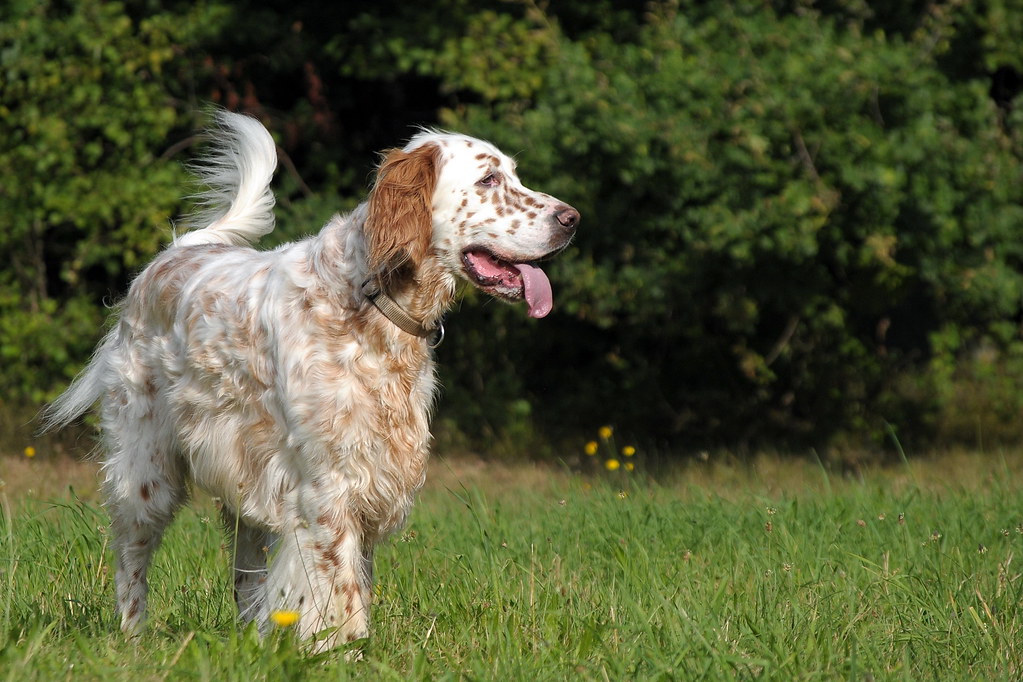
WorldAnimalFoundation.org is reader-supported. When you buy through links on our site, we may earn an affiliate commission. Learn More
Dogs are our friends, guardians, and helpers. For thousands of years, humans and dogs have hunted together, forming strong bonds. While hunting is no longer essential for survival, it remains a valued sport for many, fostering a unique partnership between man and dog. Though hunting can be controversial, many engage in it respectfully and responsibly, further strengthening their bond with their canine companions.
There are various types of hunting dogs, each breed suited to different prey and environments. A good hunting dog should possess a strong prey drive, be trainable, have endurance, and be athletic. Hunting is made even better with a loyal dog by your side.
If you’re an avid hunter seeking the perfect four-legged companion, some breeds are better suited for the job than others. Wondering which breeds make the best hunting dogs? Read on for our comprehensive guide to the best hunting dog breeds.
Types of Hunting Dogs
1. Spaniels

A spaniel is a type of gun dog specifically bred to flush the game out of the dense brush. Valued for their excellent sense of smell, spaniels work closely with hunters to flush birds into the air for a clear shot. They need to stay within shotgun range so the hunter can shoot the bird as soon as it is found and flushed.
Spaniels come in two types: water spaniels, used to retrieve waterfowl, and land spaniels, which excel at flushing pheasants, rabbits, and other field prey. Most spaniels have a broad muzzle, long floppy ears, and a wavy, long coat. They come in various colors and sizes; while some are excellent hunters, others make perfect lap dogs.
For those seeking a dog that excels in hunting waterfowl, the Irish Water Spaniel is a great option. With its water-repellent curly coat and tall stature, this breed can easily navigate rough terrain and sniff out feathered game. The Boykin Spaniel, another American favorite, is also well-suited for retrieving waterfowl due to its compact size and multi-talented skill set.
The English Springer Spaniel is named for its ability to “spring” game out of hiding places, flush and retrieve prey all day long, and then head home to play all night. Cocker Spaniels, named for their favorite prey, woodcocks, use their keen sense of smell to find and flush out birds, making them adept bird dogs.
2. Terriers

Terriers are a group of dogs that originated in the United Kingdom, initially bred to hunt small prey like rodents, foxes, and badgers that lived in underground burrows. While most Terriers today are beloved companions and show dogs, they still retain their strong hunting instincts and prey drive. Without any training, Terriers will naturally chase after small animals or anything that moves.
Hunting is deeply ingrained in a Terrier’s DNA, and they will persist until the job is done, no matter how challenging it might be. Various training methods can enhance their hunting skills, and Terriers are known for their intelligence and excellent intuition.
Terriers are not only quick but also agile, capable of squeezing into tight spots, making it difficult for small animals to hide. They are also fantastic diggers and will eagerly dig out animals trying to burrow underground. Terriers are courageous, often taking on prey larger than themselves without fear, showcasing their fearless attitude.
Besides being great hunters, Terriers are highly loyal and fun dogs to have at home. Their energetic and spirited nature makes them wonderful companions. Popular terrier breeds include the Jack Russell Terrier, Border Terrier, and Patterdale Terrier.
3. Hounds

Since ancient times, hounds have been loyal partners to hunters, providing invaluable assistance in tracking and locating prey. Hunting hounds have keen noses to detect the presence of game and can track scents with remarkable accuracy. Their loud voices help alert hunters when they locate prey.
Hounds are bred for different environments, with some specializing in water and others on land. They are categorized into two main types: sight hounds and scent hounds. Sight hounds, like Afghan Hounds or Greyhounds, primarily hunt by sight and speed. They have excellent vision and can detect even the slightest movements, allowing them to outrun almost any fast and agile quarry.
Scent hounds, on the other hand, hunt by following a smell or scent. With their extremely sensitive noses, they can track a scent over long distances and even across water. Many scent hounds, such as Bloodhounds, Beagles, and Foxhounds, have long, drooping ears that help them concentrate fully on scents. These breeds are often kept as family pets as well.
Hounds have boundless energy and need to work, making proper training incredibly important for both the hound and the hunter.
4. Setter

Setter breeds are renowned for their unique hunting technique of crouching or “setting” when they find their prey. This instinctive behavior, where a setter takes a low stance with its body close to the ground, allowed hunters in the past to cast a net over the game without obstruction. While this specific tactic is less necessary today with the use of firearms, it remains a defining characteristic of setter breeds.
If you’re looking for an active canine companion, a skilled hunting dog, or a loyal family pet, consider a setter breed. The Irish Setter, Gordon Setter, English Setter, and Irish Red and White Setter are outstanding breeds that excel both in the field and at home. These setters are known for their hunting prowess and their family-friendly disposition, making them beloved companions.
As hunting dogs, setter breeds often have a strong prey drive, which can make them less compatible with small animal pets in the home. They might chase cats and small dogs, but with proper training and socialization from a young age, many setters can learn to coexist peacefully with other pets.
5. Retrievers

Retrievers are a type of hunting or gun dog known for their ability to spot and retrieve birds shot down by hunters. With webbed paws, they are excellent swimmers, and their soft mouths allow them to carry birds without damaging them, making the game edible for their human companions. Retrievers are highly trainable, intelligent, and eager to please, which makes them patient and quick learners.

They excel in various roles, including assistive service, therapy, detection, and search and rescue. Retrievers love to learn new skills and face new challenges, making them excellent working dogs. If you enjoy playing fetch, retrievers are always up for the game.
Two retriever breeds, the Labrador Retriever and the Golden Retriever, have consistently ranked in the top three dog breeds in the U.S. for decades. Historically used for hunting birds, especially ducks, and waterfowl, these breeds are also well-known for being excellent family pets. Retrievers are incredibly popular due to their sweet demeanor and energetic personalities, making them beloved companions for many households.
6. Pointing dogs

The alert and even-tempered Pointing dog is a delightful companion, both in the hunting field and at home. Even before guns were invented, Pointing dogs were used for bird hunting. The dog would locate the prey, allowing the hunter to throw a net over both the dog and the birds to catch them. Pointers were later trained to stand still when a bird is flushed, and the gun is fired, waiting for further instruction before retrieving the bird. This ensures the hunter can get a clear shot without risking the dog’s safety.
Their willingness to learn and natural athleticism also make them successful in obedience training. They are fun-loving dogs, even into adulthood, with a playful and sometimes mischievous nature. They love being the center of attention, so teaching them the household rules is crucial.
Pointers are dignified dogs that are confident with strangers and other dogs. They are protective of their territory and family, making them excellent watchdogs that will alert you to anything unusual. As a very active breed, Pointers need plenty of exercise to stay happy and healthy.

Notable pointing dog breeds include the Pointer dog, German Shorthaired Pointer, German Wirehaired Pointer, and Pudelpointer.
7. Cur

A “cur” refers to several North American working hounds bred for hunting, herding, or protecting farms and ranches. Today, many of these tough yet affectionate dogs are kept purely as pets. Experts often call them “treeing hounds” because of their ability to track prey, scare them into trees, and bark until their owners arrive. Curs use their vocalizations to herd cattle, fend off bears or cougars, and alert their owners to the presence of prey.
Highly devoted to their masters, curs are easy to train. They are loving towards their families but tough and fearless when facing predators. They can endure cold winters and harsh summers, making them versatile working dogs.
The Mountain Cur was popular among American pioneers for its ability to cover a lot of ground on the hunt and instinctively “tree” prey. Similarly, Black Mouth Curs are multipurpose hunters capable of tracking, herding, and protecting.
To know a cur dog is to love a cur dog. They are handsome, utterly devoted, hardworking, and protective, making them excellent companions for those who appreciate their loyalty and resilience.
Conclusion
There are various hunting dog breeds that excel in different types of hunting. Whether you’re interested in upland bird hunting or retrieving downed birds, there’s a hunting dog breed suited for your needs. The Labrador Retriever and Golden Retriever dogs are popular choices among bird hunters for their intelligence and retrieving skills.
For those interested in waterfowl hunting, the Chesapeake Bay Retriever and Nova Scotia Duck Tolling Retriever are excellent options. Hunting dogs are not only skilled in the field but also make wonderful family dogs.
These breeds, including those adept at hunting small game, are cherished by dog owners for their versatility, loyalty, and ability to seamlessly transition from bird dog to beloved family dog.








